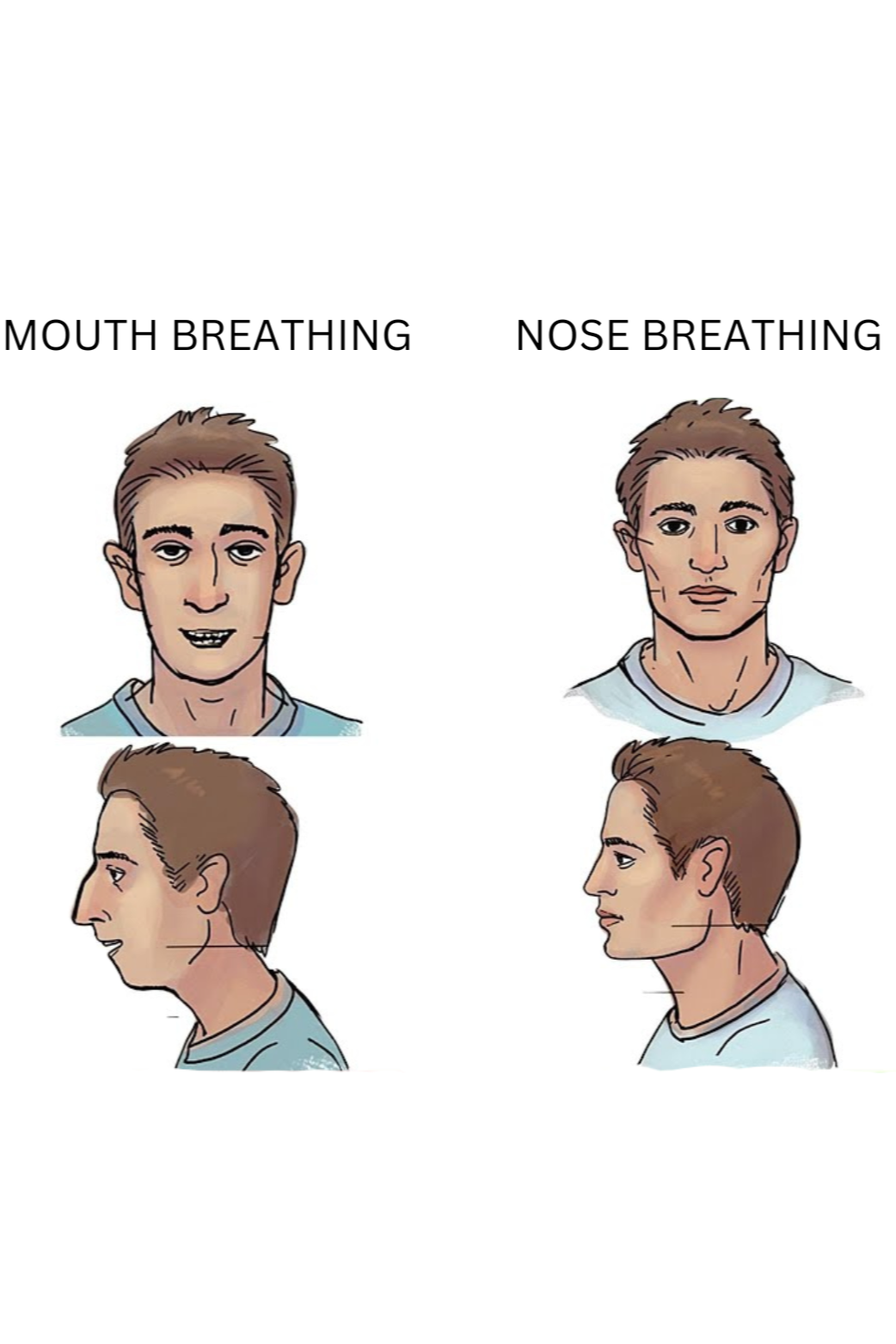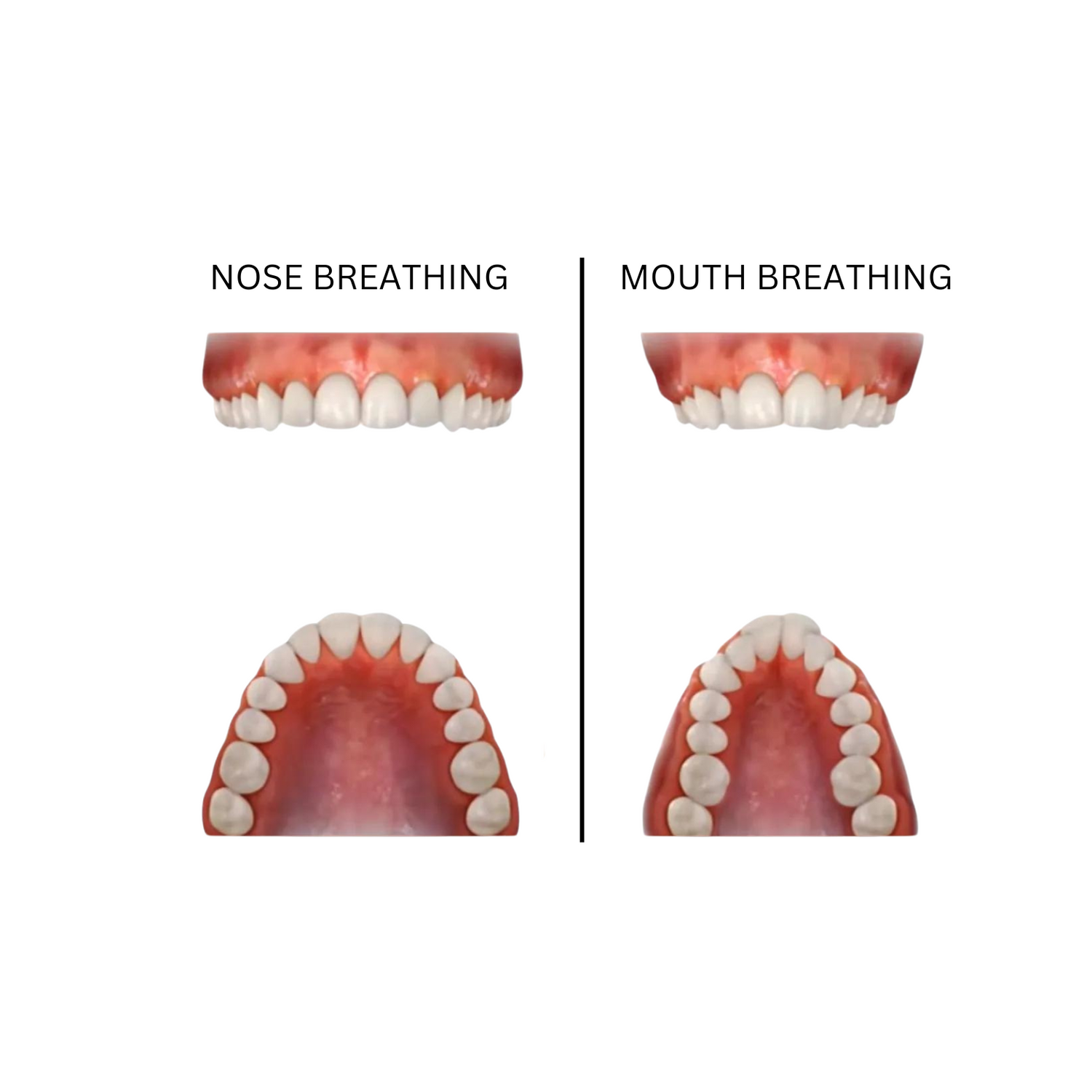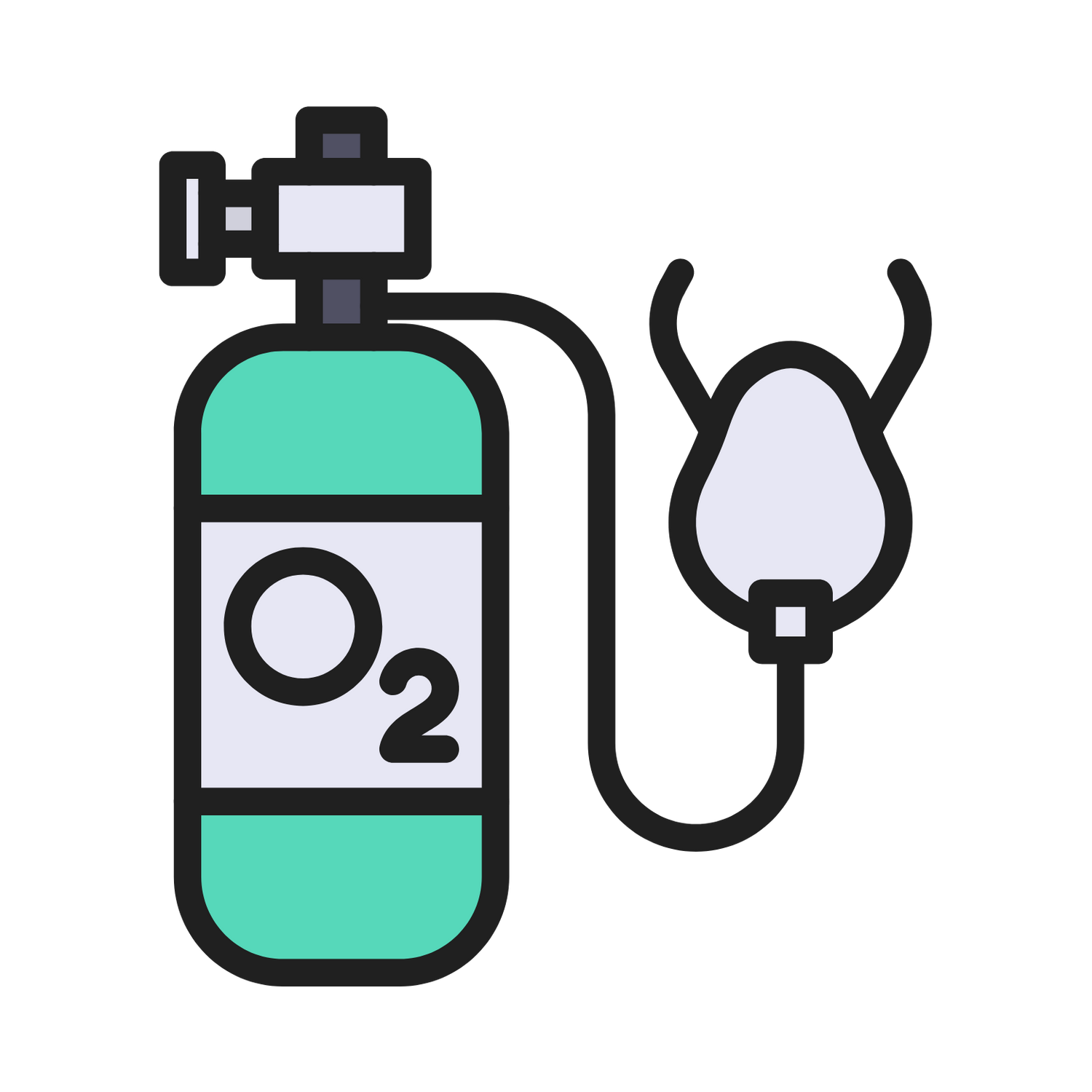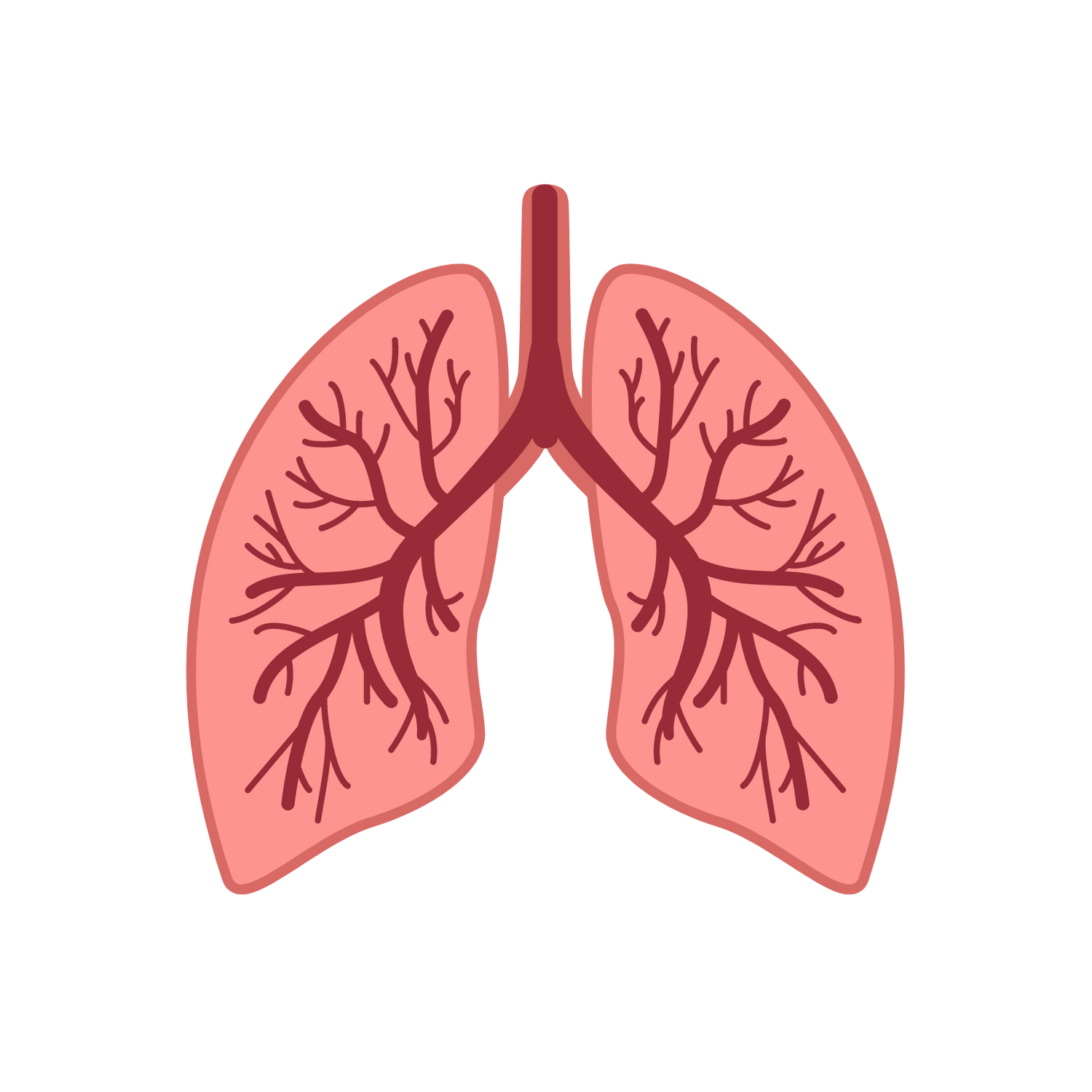Why Is Nasal Breathing Important?
Breathing is something we do unconsciously, but how we breathe can significantly impact our overall health and well-being. Nasal breathing, or breathing through the nose, is not just about taking in air; it's about optimizing the body’s functions, promoting better sleep, enhancing physical performance, and improving mental health. Discover the powerful benefits of nasal breathing and why it's essential for a healthy lifestyle.

1. Enhances Facial Attractiveness and Structure
Nasal breathing plays a crucial role in the proper development and structure of the face, particularly in children. When you breathe through your nose, your tongue naturally rests against the roof of your mouth, promoting proper growth of the upper jaw and a wider dental arch. This growth pattern results in a more balanced and symmetrical face.
- Benefit in Children: Encouraging nasal breathing from an early age helps in developing a well-defined jawline, straight teeth, and a harmonious facial structure. It also minimizes the risk of developing a long, narrow face and dental issues commonly associated with chronic mouth breathing.
- Benefit in Adults: For adults, maintaining nasal breathing helps to preserve facial symmetry, accentuate cheekbones, and promote a more defined jawline. Unlike mouth breathing, which can lead to muscle tension and sagging in the lower face, nasal breathing supports a more relaxed and natural appearance.

2. Promotes Better Sleep and Reduces Snoring
Breathing through the mouth during sleep can lead to airway obstructions, resulting in snoring and disrupted sleep patterns. Nasal breathing helps keep the airways open and maintains a steady airflow, allowing for uninterrupted, restful sleep.
- Benefit: Nasal breathing reduces snoring and symptoms of sleep apnea, improving the quality of sleep for both the individual and their partner. It also prevents dry mouth, which often occurs when breathing through the mouth at night, leading to a fresher feeling upon waking. By promoting deeper and more restorative sleep, nasal breathing supports overall physical and mental health, including improved mood, better concentration, and enhanced energy levels during the day.

3. Supports Optimal Oral Health
Mouth breathing dries out the mouth, reducing saliva production, which is vital for maintaining oral health. Saliva acts as a natural cleanser, neutralizing acids and washing away food particles and bacteria.
- Benefit: By maintaining adequate saliva levels, nasal breathing helps protect teeth from cavities, reduces the risk of gum disease, and prevents bad breath. Proper nasal breathing also minimizes the risk of developing oral issues such as gingivitis, enamel erosion, and oral thrush, which are more common when the mouth is dry. Furthermore, nasal breathing reduces the chances of developing an improper bite (malocclusion) caused by the altered positioning of the tongue in chronic mouth breathers.
-
AirFlow Mouth Tape for Better Sleep
Regular price €9,99Regular priceUnit price / per€14,99Sale price €9,99Sale -
AirFlow Nose Strip for Improved Breathing
Regular price €9,99Regular priceUnit price / per€14,99Sale price €9,99Sale -
Ultimate 1 Month Pack
Regular price €19,98Regular priceUnit price / per€29,98Sale price €19,98Sale -
Ultimate 6 Month Pack
Regular price €102,00Regular priceUnit price / per€179,88Sale price €102,00Sale
-

4. Enhances Physical Performance
Nasal breathing optimizes the body's oxygen exchange process, which is crucial during physical activities. When you breathe through your nose, the air is filtered, warmed, and humidified, allowing for a more controlled intake of oxygen.
- Benefit: This controlled breathing increases oxygen uptake, allowing muscles to perform more efficiently. Nasal breathing helps maintain a balanced breathing rhythm, reducing the risk of hyperventilation and improving stamina during workouts, sports, and other physical activities. Over time, this can lead to enhanced endurance, faster recovery, and improved overall athletic performance. Additionally, nasal breathing helps regulate carbon dioxide levels in the blood, which is essential for optimal muscle function and reduced lactic acid buildup.
-

5. Improves Focus and Cognitive Function
The brain requires a constant and steady supply of oxygen to function optimally. Nasal breathing ensures a more efficient exchange of oxygen and carbon dioxide, which is vital for maintaining mental sharpness and concentration.
- Benefit: When you breathe through your nose, the air is filtered and humidified, providing the brain with a cleaner and more balanced supply of oxygen. This can enhance cognitive functions, improve focus, support mental clarity, and even boost memory. Additionally, nasal breathing encourages a slower, more rhythmic breathing pattern, which can calm the mind and enhance concentration, making it beneficial for activities that require mental precision, such as studying, working, or practicing mindfulness.
-

6. Reduces Anxiety and Stress
Nasal breathing is closely linked to the body's relaxation response. By stimulating the parasympathetic nervous system, nasal breathing helps counteract the effects of stress and anxiety.
- Benefit: Slow, deep nasal breathing lowers cortisol levels, the body’s primary stress hormone, and promotes a calm state of mind. It can also reduce heart rate and blood pressure, helping to alleviate feelings of tension and anxiety. Engaging in nasal breathing exercises can be a powerful tool for managing stress and improving emotional stability, aiding in relaxation during yoga, meditation, or simply winding down after a long day.

7. Improves Oxygen Absorption
When you breathe through your nose, the nasal passages produce nitric oxide, a gas that plays a critical role in enhancing blood vessel dilation and increasing oxygen absorption in the lungs.
- Benefit: Improved oxygen absorption supports the body's energy production, enhances overall vitality, and boosts the immune system. Nitric oxide also has antimicrobial properties, helping to neutralize pathogens in the air before they reach the lungs. This process not only makes breathing more efficient but also aids in fighting off illnesses and infections, contributing to a stronger, healthier body.

8. Natural Air Filtration
The nose is equipped with tiny hairs (cilia) and mucus that act as natural filters, trapping dust, allergens, bacteria, and other harmful particles from the air you breathe in.
- Benefit: Nasal breathing reduces the risk of respiratory infections, allergies, and lung irritation by filtering, humidifying, and warming the air before it enters the lungs. This filtration process not only protects the respiratory system but also improves the quality of air you breathe, minimizing the exposure to pollutants and pathogens.

9. Enhances Lung Function
Nasal breathing promotes diaphragmatic (deep) breathing, allowing the lungs to expand fully and utilize more of their capacity.
- Benefit: This deeper, more controlled breathing pattern increases oxygen intake and supports a more balanced oxygen-carbon dioxide exchange in the blood, which is vital for maintaining healthy blood pH levels. Enhanced lung function also facilitates the removal of carbon dioxide, reducing the risk of symptoms associated with hyperventilation, such as dizziness and fatigue.
-
AirFlow Mouth Tape for Better Sleep
Regular price €9,99Regular priceUnit price / per€14,99Sale price €9,99Sale -
AirFlow Nose Strip for Improved Breathing
Regular price €9,99Regular priceUnit price / per€14,99Sale price €9,99Sale -
Ultimate 1 Month Pack
Regular price €19,98Regular priceUnit price / per€29,98Sale price €19,98Sale -
Ultimate 6 Month Pack
Regular price €102,00Regular priceUnit price / per€179,88Sale price €102,00Sale
-
10. Balances the Nervous System
Nasal breathing activates the vagus nerve, which plays a key role in regulating the parasympathetic nervous system—the body's natural relaxation response.
- Benefit: By balancing the fight-or-flight response, nasal breathing promotes emotional stability, aids in stress management, and contributes to a sense of calm. Regular practice of nasal breathing can improve heart rate variability, a marker of stress resilience, leading to better mental and emotional health.
-
11. Temperature and Humidity Regulation
The nose serves as a natural humidifier and temperature regulator for the air you breathe.
- Benefit: By warming and moistening the air, nasal breathing helps protect the delicate tissues of the respiratory system from irritation, reducing the risk of respiratory conditions such as asthma and bronchitis. This natural regulation is particularly beneficial in cold or dry climates, where mouth breathing can cause dryness and discomfort.
-
12. Aids in Correct Posture
Nasal breathing encourages the use of the diaphragm and core muscles for breathing, rather than relying on the chest and shoulders.
- Benefit: This diaphragmatic breathing supports proper posture, reduces muscle tension in the neck and shoulders, and aligns the spine. Improved posture not only prevents musculoskeletal issues but also contributes to a healthier respiratory system by allowing for more efficient lung expansion.







